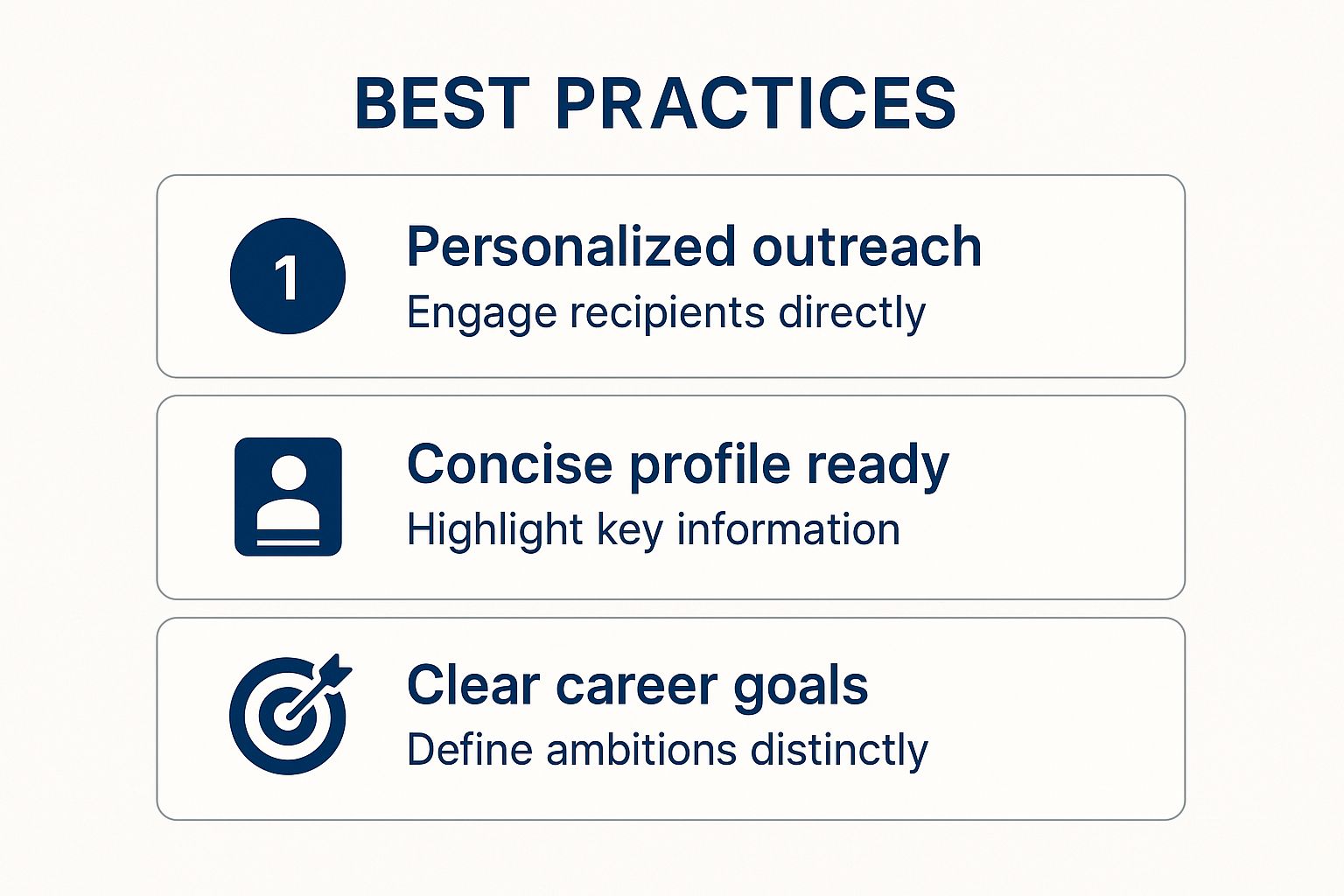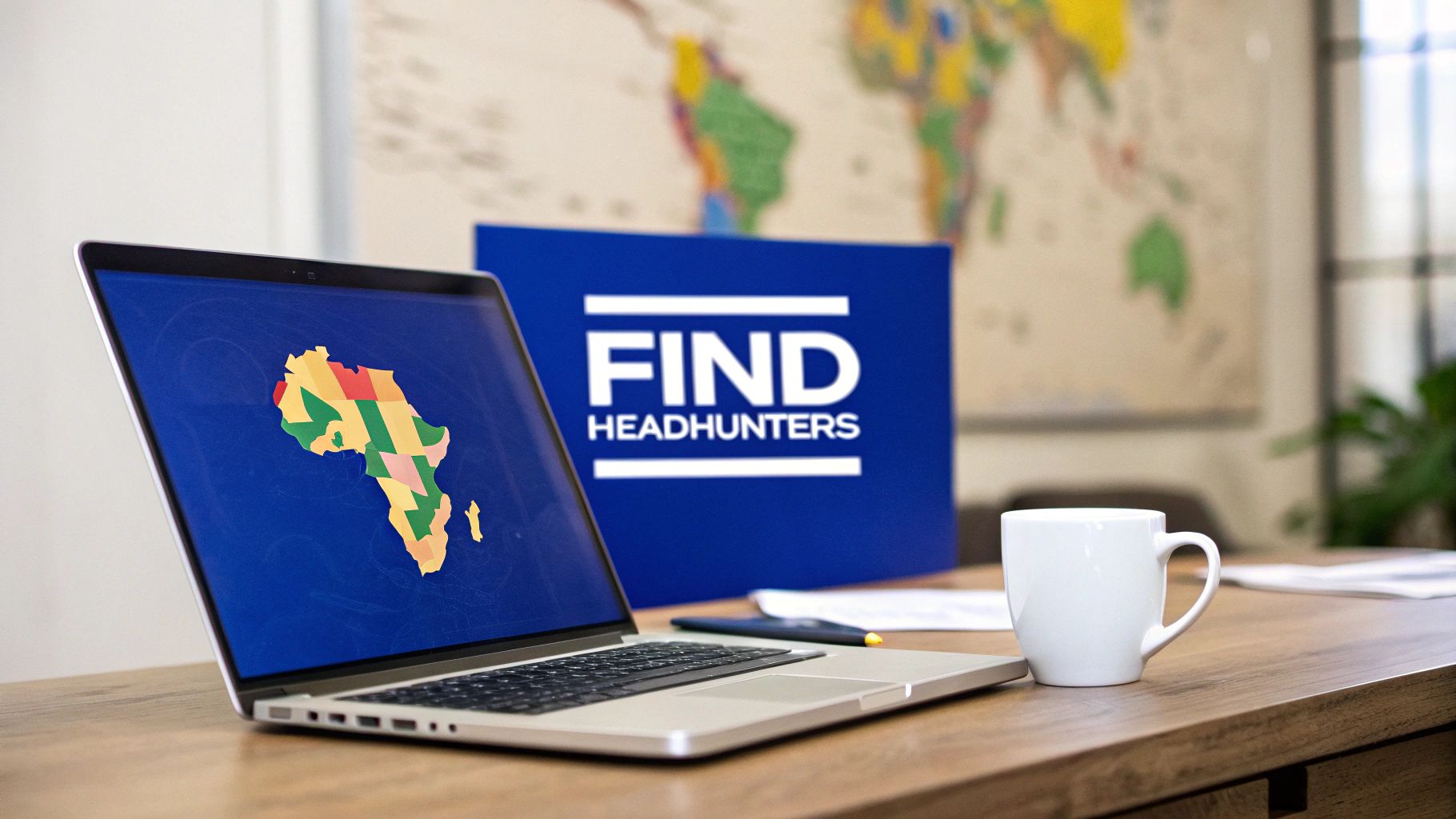Finding the right headhunter boils down to a simple, effective process: pinpoint your exact needs, hunt on specialised platforms like LinkedIn, and then vet potential partners like your business depends on it. It does. This shifts the whole exercise from a frustrating search into a focused mission to find a genuine recruitment ally.
Why the Right Headhunter Is a Game Changer

Let's be real—filling specialised roles right now is tough. Traditional job boards are flooded, but the critical skills gaps, especially in tech and finance, are as wide as ever. This is precisely where a good headhunter becomes essential, not just a nice-to-have.
A great headhunter doesn't just post an ad and hope for the best. They are actively sourcing high-calibre, passive candidates—those talented people who aren't even looking for a new job but would be perfect for yours.
Tapping into the Hidden Talent Market
This pool of passive candidates is where the real gems are found. They're usually top performers, happy where they are, and definitely not scrolling through job sites on their lunch break. A headhunter’s real value is their network and their knack for approaching these individuals discreetly, framing your opportunity in a way that genuinely piques their interest.
When you bring in a headhunter, you’re not just filling a role; you're gaining a serious competitive advantage. They connect you with candidates your competitors will never see, slashing your time-to-fill for senior or niche roles and dramatically lowering the risk of a bad hire.
Making Sense of a Complex Hiring World
The hiring landscape is more challenging than ever. Recent figures show that around 33% of UK employers are struggling with hard-to-fill vacancies. In the private sector, that number shoots up to 45%. It's no surprise then that, according to a recent report on UK HR statistics, 59% of UK businesses now turn to recruitment agencies to find the right people for these crucial positions.
Ultimately, partnering with the right headhunter is an investment. It’s an investment in your time, in reducing hiring risks, and in connecting with the kind of top-tier talent that will actually push your business forward.
Get Your Own House in Order First
Before you even think about finding a headhunter, you need to know exactly what—and who—you're looking for. Simply throwing a generic job description over the fence is a surefire way to waste everyone's time, especially your own.
What you need is a proper strategic brief. This isn't just about listing tasks; it's about painting a picture of success. Think about the impact this person will have. What problems will they solve in their first year? What will they own? What does 'brilliant' look like for them?
For example, instead of just asking for a "Senior Accountant," you could specify you need someone to "slash the month-end closing time by 20% and get a new financial reporting system live within six months." See the difference? That's the kind of detail that gets a great headhunter excited. It gives them a mission, not just a shopping list.
Clarify Your Deal-Breakers
Once you know what success looks like, you can get granular about the person you need to achieve it. I find it helpful to break this down into a few key areas for my clients.
- Must-Have Skills: What technical abilities and soft skills are absolutely non-negotiable? Be ruthless here.
- Proven Experience: Are you looking for someone with specific industry experience, like SaaS or fintech? Have they managed remote teams before?
- Team Dynamics: This is crucial, especially with remote teams in South Africa. What kind of personality thrives at your company? Are you collaborative and chaotic, or quiet and focused? Be honest.
A detailed brief is your best filtering tool. It scares off the recruiters who can't deliver and gives the right one the ammo they need to find the person you actually need, not just someone who ticks a few boxes on a CV.
Finally, let's talk money. You have to be ready to discuss the salary and the headhunter's fee. In the UK, you're typically looking at a fee of 20% to 35% of the candidate's first-year salary. Having your budget sorted from the outset shows you're serious and ready to move, which puts you at the top of a good headhunter's priority list.
Where to Find Specialist Headhunters
Forget trawling through endless Google results for "best headhunter". That’s a surefire way to get lost. To find a true recruitment partner, you need to be surgical and go where the specialists actually operate and build their networks.
Your best bet is almost always LinkedIn. It's the primary hunting ground for recruiters, but you have to use it smartly. Simply typing "headhunter" into the search bar won't cut it.
Instead, switch to the "People" filter and get specific. Think about the titles they use: "Executive Search Consultant," "Talent Partner," or "Recruitment Consultant." Combine those with keywords that define your niche, like "Fintech" or "SaaS Sales." This is how you start to separate the wheat from the chaff.
Refining Your Search on LinkedIn
Once you’ve got some initial results, it's time to dig deeper with the advanced filters. You can narrow your search by location if you need someone with a local presence, or filter by their current and past companies to see if they've worked for agencies you respect.
Pay close attention to their profile summaries. You're looking for clear statements of specialisation, success stories, or specific niche expertise that aligns with your needs.

Using specific keywords and filters like this is how you quickly turn a massive, generic list into a targeted shortlist of real contenders.
But don't stop at LinkedIn. Some of the most valuable channels are often the ones people forget about:
- Professional Association Directories: Organisations like the Institute of Directors (IoD) often have directories of approved service providers, which can include properly vetted recruitment firms.
- Industry-Specific Forums and Groups: Think about where the leaders in your field hang out online. Whether it’s a private Slack community or a niche industry forum, you can bet the best specialist recruiters are in there, listening and participating.
- Referrals from Your Network: This one is gold. Ask trusted contacts, advisors, or board members who they’ve used for their most critical hires. A warm introduction to a proven headhunter is invaluable.
The real aim here is to find someone who lives and breathes your industry. A generalist can find you candidates, sure. But a specialist understands the market nuances, already knows the key players, and can speak with genuine authority to the high-calibre talent you’re trying to attract.
The UK recruitment market is a massive industry, valued at around £141 billion. With the average cost to hire an employee now sitting at about £6,125, it’s a smart move to invest in a specialist who knows how to navigate this complex landscape, especially when you’re facing skills shortages.
Once you've built a longlist, start looking at their digital footprint. Check for social proof—client recommendations and candidate testimonials on their LinkedIn profile are great indicators. As you narrow it down, our guide offers more strategies on how to find a headhunter that truly fits your needs: https://www.beyondhire.co/blog/how-to-find-a-headhunter.
Putting in this diligence upfront is what makes the difference between a frustrating search and a successful partnership.
Alright, you've got your list of potential headhunters. Now for the hard part: figuring out which one is actually the right partner for you. Moving from a list of names to a trusted advisor takes a bit of work, but it’s a crucial step. It’s less about their fee structure and more about how they think, operate, and ultimately, deliver.
That first call is everything. It’s your chance to see if you’re talking to a transactional recruiter or a genuine strategic partner. The transactional type will talk your ear off about their massive database and how fast they can send you CVs. A true partner, on the other hand, will start by asking you sharp, insightful questions. They’ll want to get under the skin of your business, understand the real impact of the role, and get a feel for your company culture. They’re trying to become an extension of your team, not just a supplier.
To get this right, you need to know how to ask better questions. This is what will really uncover their capabilities and whether they're the right fit for your business.
What to Dig Into During Your Vetting Calls
Don’t get bogged down in a conversation that only revolves around fees. You need a much clearer picture of their process and the true depth of their network.
Here are a few things I always make sure to probe:
- Their Search Process: Ask them to walk you through it, step-by-step. How do they actually find and connect with top-tier candidates who aren't scrolling through job boards?
- Their Niche Network: Get them to share specific (but anonymised) examples of recent placements in your industry. You want to know if they really know the key players.
- The Candidate Experience: How will they represent your brand? A clumsy, unprofessional approach can do serious damage to your company’s reputation long before a candidate even speaks to you.
This image sums up a few key points to keep in mind as you head into these important conversations.

As you can see, being prepared is half the battle. You need to have a clear idea of what you want and a solid brief before you even start the outreach.
Headhunter Vetting Checklist
To help you stay focused during your calls, I've put together a quick checklist. Use it to compare a few different headhunters and see who really stands out.
Think of this table as your scorecard. A good partner will tick all the right boxes, while the wrong one will show their true colours pretty quickly.
A great headhunter doesn’t just fill a vacancy; they give you a live view of the market. They should be your go-to source for intel on salary trends, what your competitors are up to, and where to find niche skills.
This market intelligence is gold, especially in a dynamic market like South Africa's tech scene. Knowing what a competitive package really looks like can be the difference between landing your dream candidate and losing them to a rival.
At the end of the day, this decision comes down to trust and alignment. The vetting process is your opportunity to find a partner who not only gets your industry but also genuinely cares about helping you find brilliant people.
For a deeper dive into building a successful relationship, take a look at our guide on https://www.beyondhire.co/blog/how-to-work-with-recruitment-agencies.
Forging a True Partnership with Your Headhunter

You've done the hard work and picked your headhunter. Now, the real work begins: turning that choice into a powerful alliance. Don't just fire off a generic, copy-pasted email—it’s the fastest way to get ignored.
Your first message needs to be sharp, personal, and prove you’ve done your homework on their niche. Get straight to the point about why this role is crucial and attach that detailed brief you prepared. This immediately signals that you're an organised and serious client.
A great recruiter won't just take your brief and run with it. They'll push back, ask tough questions, and use their on-the-ground market knowledge to refine it with you. This back-and-forth is the sign of a healthy partnership and is exactly what you want when working with top remote recruitment agencies.
Kicking Things Off Right
Once the ink is dry on the contract, that first kickoff call is everything. It sets the tone for the entire search.
- Go Beyond the Job Spec: Forget just reading the job description. Talk about your company culture, the quirks of the team, and the actual problems this new person will be hired to solve. Paint a vivid picture.
- Agree on What Success Looks Like: Set clear timelines and KPIs. When do you expect to see the longlist? The shortlist? When will interviews start? Get it all out on the table.
- Establish a Rhythm for Communication: How often will you check in? A weekly call? A bi-weekly report? Decide on a cadence that works for both of you to review progress and tweak the strategy as you go.
A successful kickoff call is more than just a briefing; it’s a strategy session. This is your chance to turn your headhunter from a simple supplier into a genuine extension of your hiring team.
Got Questions About Headhunters? We’ve Got Answers
If you're thinking about bringing a headhunter on board, you're not alone. But before you jump in, it’s smart to get your head around how they actually work. Getting these basics right from the start can make all the difference.
Let's dive into some of the most common questions we hear from businesses just like yours.
Retained vs. Contingency: What’s the Real Deal?
So, what's the actual difference between these two models? It really comes down to commitment.
A retained search is like hiring a dedicated partner. You pay a portion of the fee upfront, and in return, that headhunter works exclusively for you on that role. This is your best bet for those crucial senior-level or highly specialised positions where you simply can't afford to get it wrong. It guarantees you're their top priority.
Then there's the contingency search. Think of this as a "no win, no fee" arrangement. You only pay if you hire a candidate they find, but the headhunter is likely working on several similar roles for other companies. It can be a good option for less urgent or easier-to-fill positions, but you won't get that same level of dedicated focus.
How Much Do Headhunters Actually Cost?
This is usually the next question on everyone's mind. In the UK, you can expect headhunter fees to be a percentage of the candidate's first-year guaranteed salary.
Typically, this falls somewhere between 20% and 35%. The final figure will depend on a few things, like how senior the role is, how tough the search will be, and which model you’ve chosen (retained searches often sit at the higher end). Just make sure everything is crystal clear in your contract before signing.
If a headhunter isn't bringing you the right people, don't just sit and wait. Get a call in the diary straight away. A good partner will want your feedback to recalibrate their search and sourcing strategy. It’s a two-way street.
As you get deeper into the world of recruitment, it's also worth keeping an eye on how technology is changing the game. Understanding the evolving role of AI in hiring will give you a real advantage in finding top talent.

